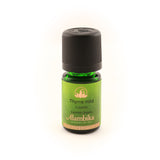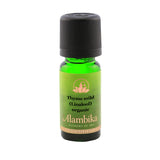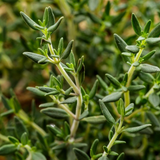Alambika Thyme Mild (Thuyanol-4) Essential Oil
Botanical name : Thymus zygis
Quality : 100% natural essential oil
Cultivation : wild growth, certified organic
Suitability as : Food
Scent note : Head
Plant part : flowers/plant
Origin : Spain
Main chemotypes : (INCI) linalool, terpinene-4-ol, myrcene, gamma-terpinene
USE
Thyme Linalol is floral and herbaceous. It is a milder type of Thyme, that supports nervous, respiratory and digestive systems. A wonderful warming tonic that is also used in hair care preparations. The most suitable Thyme to use for children because of its soft properties.
Thyme has an invigorating effect on your mind and helps you to let go of tension and stress of any kind and to breathe deeply, to feel freedom and to discover possibilities for you in this freedom.
Thyme is a great essential oil for a morning foot massage when you may not have time to massage your entire body. Mix a carrier oil of your choice, such as jojoba oil or almond oil, with 1 drop of thyme oil and massage your feet with it.
You can also add a drop of thyme to your shampoo to stimulate your hair roots.
ABOUT THE PLANT
Did you know that some plant species behave almost chameleon-like, producing essential oils with different effects depending on their geographical origin? Thyme, rosemary and basil are exemplary representatives of this unique phenomenon.
With its different variants, thyme can be a real helper for the immune system - especially in the cold season.
It's really exciting: we're talking about the same plant that simply grows in different places and produces essential oils. But these oils can have completely different effects depending on their origin! Isn't that fascinating?
Thyme Linalool - typically contains between 35-50% Linalol and other terpene alcohols. The "gentleest" chemotype of thyme. It can be applied to the skin diluted in a carrier oil and is a valuable ally against fatigue. It is also considered a "layman's" oil as its mild yet potent strength strengthens the body's protective systems without being aggressive.
Thyme comes from France and Spain. In spring, the dwarf shrub develops stalks and small leaves. The inflorescence displays lacy arrangements with the flowers being rosy, white or light purple. Flowering time is from May to June.
The scent can be described as spicy and lemony. The main chemical ingredients are Linalol, Linanyl Acetate, Geraniol, Geranyl Acetate, Beta Caryophyllene, Alpha Terpineol, Borneol, these ingredients are known for their antiviral and antimicrobial effects.
It goes well with bergamot, lemon, lemon balm, lavender, lavandin, marjoram, pine, rosemary, etc.
The cosmetics and perfume industries use it as an ingredient in many products. The herbal substance is found in many foods, especially beverages and meat products. Thyme has always been one of the most important plants in European natural medicine and is used and praised for its ability to invigorate the mind and release tension. The herb has already been known as a beneficial medicine by the Sumerians, Egyptians, Greeks and Romans.
Article number : 2850






